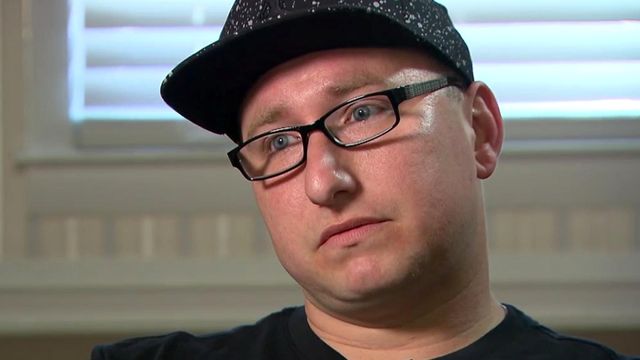Opioid addiction newest battle line for many veterans
The Department of Veterans Affairs is trying to respond after estimates show one in 10 veterans on painkillers is addicted to them.
Posted — UpdatedFormer Secretary of Veterans Affairs Robert McDonald said veterans are 10 times more likely to abuse opioids than the civilian population, which likely drives Fayetteville's numbers up. Jacksonville, another military city in North Carolina, ranks 12th on Castlight's list of worst locales for opioid abuse.
While the military is taking steps now to attack addiction, many veterans question why the military took so long to address a problem the veterans say it created.
"When I got addicted to opiates, I was like a monster," said David Bloch, who served more than six years at Fort Bragg, including a nine-month tour in Afghanistan.
Bloch injured his back during a convoy, then training made it worse. Army doctors prescribed him Percocet, Oxycontin, oxycodone and other painkillers.
"They're really quick to prescribe painkillers – I mean, really quick," he said.
Data reviewed by WRAL Investigates shows the explosive rate at which oxycodone was and continues to be prescribed in Fayetteville. In 2006, 134,000 grams were prescribed. That total more than doubled over the next decade, to 337,000 grams by 2015 – more than what was prescribed in larger cities such as Charlotte, Raleigh and Greensboro.
After surgery at Walter Reed Army Medical Center, Bloch said he wanted higher doses.
"That's when I started actually abusing it," he said. "I have my part, but they definitely turned me into something I wasn't before I joined (the Army)."
The VA estimates one in 10 veterans on painkillers is addicted.
"We know we've got an issue. We're addressing the issue. We admit we've got an issue," said Elizabeth Goolsby, director of the Fayetteville VA Medical Center.
"The entire county was late to respond," not just the military, said Goolsby, who helped lead a task force that changed the way Cumberland County deals with addiction.
"Opioid addiction is not looked at as a crime. It's looked at as an illness," she said.
That meant creating a drug court just for veterans and tapping into the state's registry that tracks prescribed painkillers.
"Our expectation is that all our providers check the registry before they prescribe an opioid and that they use methods other than medication first," she said.
John Bigger, director of Behavioral Healthcare Services for Cape Fear Valley Health, said he sees veterans and civilians prescribed painkillers to the point of addiction every day.
"In 2010, we had about 480 presentations of opioid dependence. In 2016, we had 1,800," Bigger said.
When legal prescriptions run out, many addicts turn to the streets for more meds.
"You could go within six blocks of here probably and find some," he said.
The fight against painkiller addiction also exacerbated the problem. Two years ago, the Drug Enforcement Administration required veterans to refill their prescriptions every 30 days, instead of 90, to protect against abuse, but appointment backlogs at some VA hospitals forced veterans to find pain relief on the streets – by pills or heroin.
Ken Smith, who oversees Cape Fear Valley Medical Center's detox program, said the abuse problem "got out of control, and now we're paying the price for it."
"Very often, we have to turn away people because our beds are full," Smith said.
Goolsby said the VA plans to add detox beds in Fayetteville soon. Right now, the closest inpatient VA facility is in Salisbury.
Bloch said he battled withdrawal with more and more meds. Desperate for a fix, he turned to heroin, which he said cost him his family and and his self-respect.
"I'm a soldier, and so, I had that feeling: I'm wearing this uniform, and I'm a junkie," he said with a sigh.
He eventually reported his addiction to the Army. Protocol led him to treatment, which didn't work, and when he failed drug tests, the military discharged him.
"They don't understand addiction like they should. It's a complex thing," he said. "It almost feels like they threw me away like some trash."
That's when Bloch found Carolina Treatment Center of Fayetteville, a medication-assisted program that uses methadone and other treatments – a strategy the Army frowns upon – to help addicts turn their lives around.
"This place definitely saved my life. I probably would have overdosed, honestly," he said.
"I believe, over the last few years, we've jumped into a more progressive, solution-minded mindset," said Amy Garner, director of Carolina Treatment Center of Fayetteville.
Goolsby agreed that new strategies and cooperation were needed to tackle the opioid epidemic.
"We have become more enlightened, I think, the more that we understand about opioids," she said.
VA officials said one of the biggest challenges is getting veterans to ask for help, noting addiction is one of the leading contributors to veteran homelessness. Goolsby said a study on homeless veterans first tipped officials to the scope of the addiction problem.
Bloch now takes classes at Fayetteville Technical Community College, where he's studying to be a counselor, like those who helped lift him out of addiction.
"There's hope out there," he said.
• Credits
Copyright 2024 by Capitol Broadcasting Company. All rights reserved. This material may not be published, broadcast, rewritten or redistributed.





